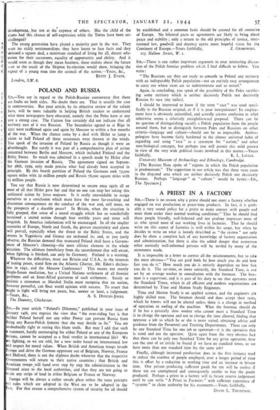Sta,—There is one rather important argument in your interesting discus-
sion of the Polish frontier problem which I find difficult to follow. You write: " The Russians say they are ready to concede to Poland any territory with an indisputably Polish population—not an entirely easy arrangement to carry out where races are so indeterminate and so mixed."
Again, in concluding, you speak of the possibility of the Poles sacrific- ing some territory which is neither decisively Polish nor decisively Russian by race (my italics).
I should be interested to know if the term " race " was used speci- fically in the Russian original, or if it is your interpolation? Its employ- ment here is obviously unjustified, and actually creates confusion in what otherwise seems a relatively .straightforward proposal. There can be no qucston of distinguishing racially a Polish population from the people around them, but to distinguish between Poles and Russians on other criteria—language and culture—should not be so impossible. Anthro- pologists have become fairly hardened to the almost universal habit of regarding and using "race " as a synonym for " nation," and other non-biological concepts, but perhaps you will permit this mild protest in view of the very wide political issues involved in this matter.—Yours University Museum of Archaeology and Ethnology, Cambridge.
[The Russian Note spoke of " regions in which the Polish population is predominant." The suggestion in our article was that there were races in the disputed area which are neither decisively Polish nor decisively Russian. Perhaps "language " or " culture " would be better.—En., The Spectator.]


























 Previous page
Previous page